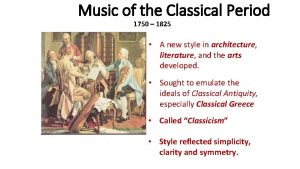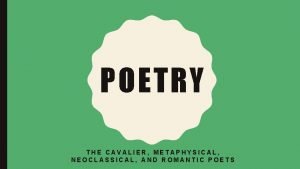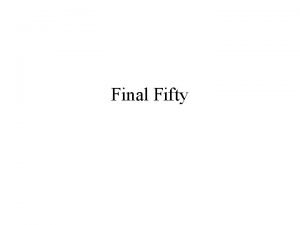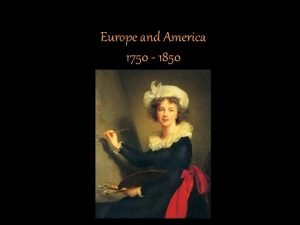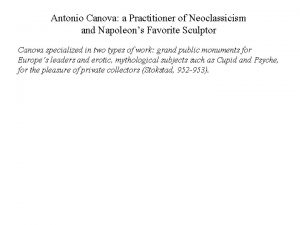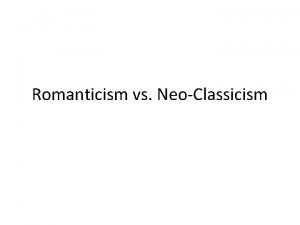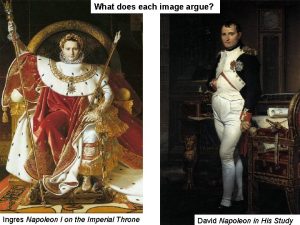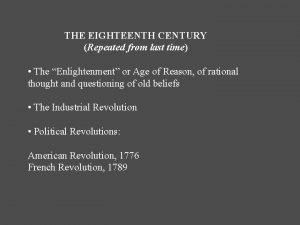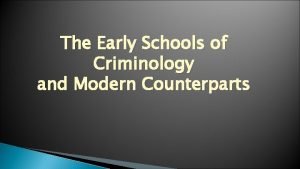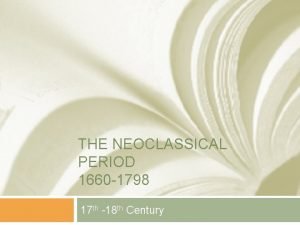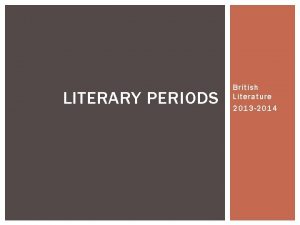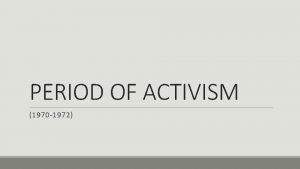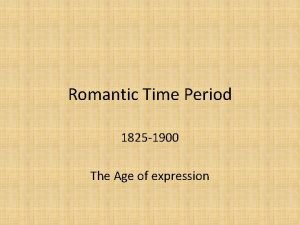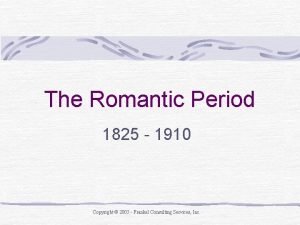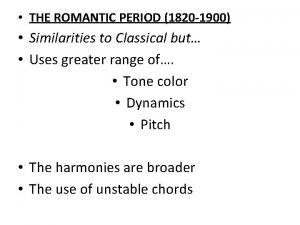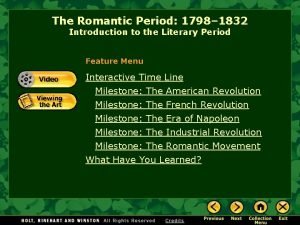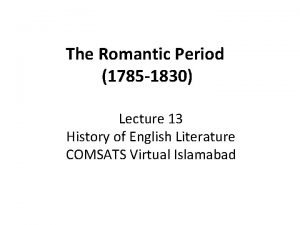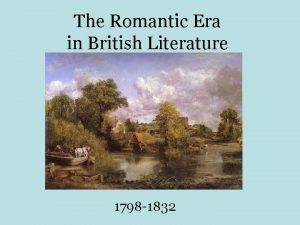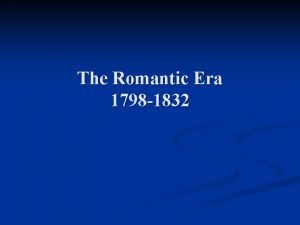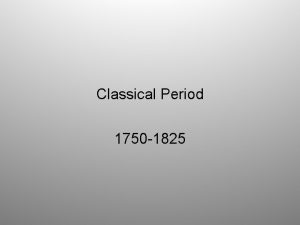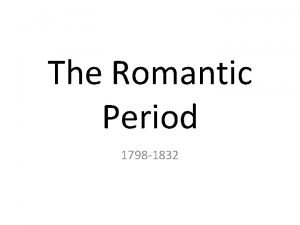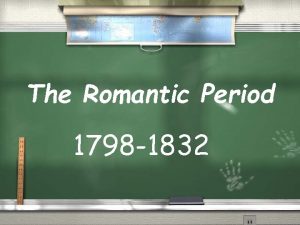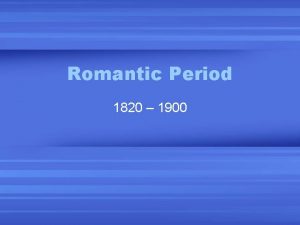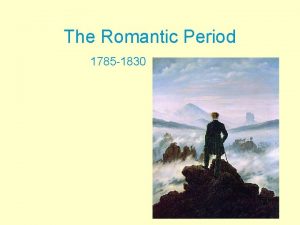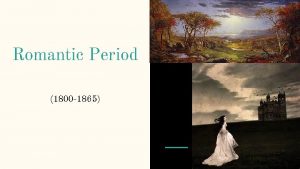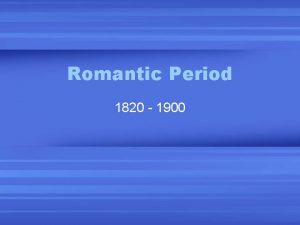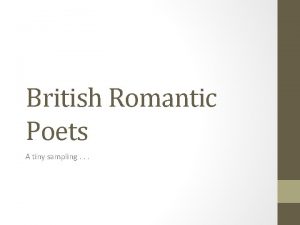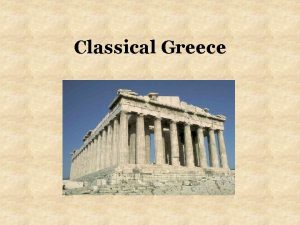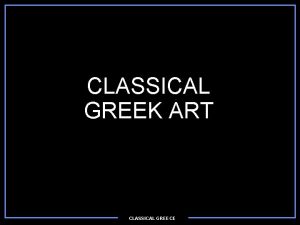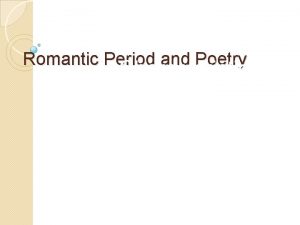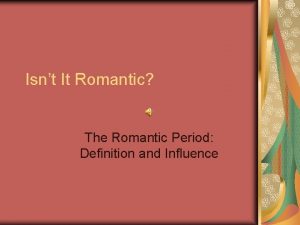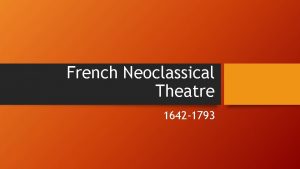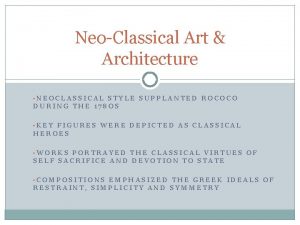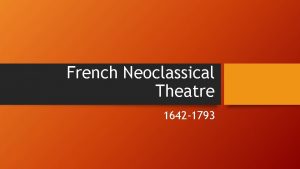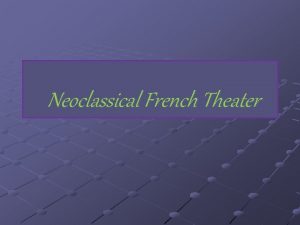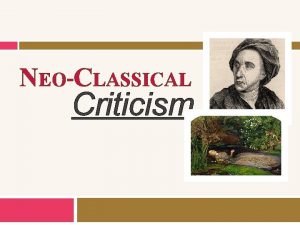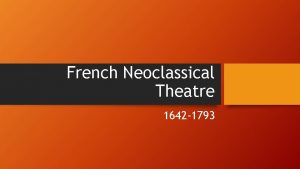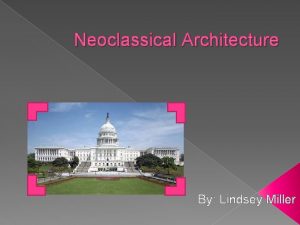THE CLASSICAL AND ROMANTIC PERIODS THE NEOCLASSICAL PERIOD

























- Slides: 25

THE CLASSICAL AND ROMANTIC PERIODS

THE (NEO)CLASSICAL PERIOD 1760 -1830 What was going on? • Early rise of industry • Rise of literacy • People moving into cities • Birth of middle class • Birth of archaeology

VOCABULARY • Neoclassical: A new wave of art inspired by Greek Classicism • Greek “Neo” = New • Greek “Klasikos” = Of the highest order • Archaeology: The study of ancient things • Greek “-ology” = The study of … • Greek “Arkhaios” = Ancient • Anthropology: The study of human beings or humanity. • Tonality: Music related to a certain scale or key. • Notation: The system used to visually represent music.

ART OF THE NEOCLASSICAL PERIOD • Inspired by Ancient Greece “Classicism” • Called “Neoclassical” (New Classical) in other arts. • Very few extra embellishments, decorations. • “What do you want to show? Okay paint/sculpt/build that. ”

THE GRAND TOUR • Rich students tour Greece and Rome • Collect discovered artifacts • Inspired imitators back home • Birth of archaeology

COMPARISON OF AN ANCIENT GREEK “BUST” AND ONE FROM THE NEOCLASSICAL ERA

“THE ARTIST MOVED TO DESPAIR AT THE GRANDEUR OF ANTIQUE FRAGMENTS” HENRY FUSELI

MADAME RAYMOND DE VERNINAC • One subject • Few embellishments • True to life

Classical Music WHAT CLASSICAL MUSIC MEANS TO MOST PEOPLE

Postmodernist Music Romantic Music Jazz Music CLASSICAL DOES NOT MEAN “NOT POP” MUSIC

TRAITS OF CLASSICAL MUSIC • Music written from 1750 -1820 • Fortepiano is dominant keyboard instrument • Standardized music notation • Getting closer to modern instruments • Ensembles change and get standardized • Symphony Orchestra • String Quartet • Woodwind Quartet • Popularization of formal performances

INSTRUMENTS OF THE CLASSICAL PERIOD CHORDOPHONES Fortepiano The Violin (duh) “Lady Blunt” mfd. 1720 Harp

15 million dollars

INSTRUMENTS OF THE CLASSICAL PERIOD AEROPHONES Natural Horn “ 5 Key” Clarinet Ophicleide

Ludwig van Beethoven Wolfgang Amadeus Mozart Franz Joseph Haydn CLASSICAL COMPOSERS

FRANZ JOSEPH HAYDN • Born 1732, Rohrau, Austria • Died 1809, Vienna, Austria • “Father of the Symphony” • “Father of the String Quartet” • “Court musician” for the wealthy Esterhazy family

STRING QUARTET

THE SYMPHONY

LUDWIG VAN BEETHOVEN • Born 1770 Bonn, Germany • Died 1827, completely deaf! • Compositions divided into 3 “periods” • Famous for his piano concertos, symphonies, and masses

BEETHOVEN’S EROICA “HEROIC” SYMPHONY • Written for French Emperor Napoleon Bonaparte • Beethoven later hated Napoleon for his invasion of Austria and attacking his home city

PIANO CONCERTO NO. 4 • Concertos are pieces of music written for a solo performer and full orchestra accompaniment. • Beethoven’s last performed piece before he was too deaf to play with an orchestra.

WOLFGANG AMADEUS MOZART

W. A. MOZART • Born 1756 Salzburg, Austria • Died 1791 Vienna, Austria • Musical prodigy discovered at young age • Toured around Europe with father and sister • Began writing music at age 5 • Died tragically early at 35

SYMPHONY 40 • Classical symphonies are much shorter than we think of today.

HORN CONCERTO
 1750s music
1750s music Neoclassicism characteristics
Neoclassicism characteristics Neoclassical poetry vs romantic poetry
Neoclassical poetry vs romantic poetry Apotheosis of homer neoclassical or romantic
Apotheosis of homer neoclassical or romantic Napoleon crossing the alps neoclassical or romantic
Napoleon crossing the alps neoclassical or romantic Canova neoclassical or romantic
Canova neoclassical or romantic Romanticism vs neoclassicism
Romanticism vs neoclassicism Third of may 1808
Third of may 1808 The death of marat meaning
The death of marat meaning Neo classical organizational theory
Neo classical organizational theory Charles goring vs lombroso
Charles goring vs lombroso Key principles of classical and neoclassical criminology
Key principles of classical and neoclassical criminology Renaissance vs neoclassicism
Renaissance vs neoclassicism Early modern period dates
Early modern period dates Characteristics of neoclassical
Characteristics of neoclassical Period of activism 1970 1972
Period of activism 1970 1972 Romantic era american literature
Romantic era american literature Vocal music of the romantic period
Vocal music of the romantic period The tristan chord
The tristan chord Romantic period characteristics
Romantic period characteristics Facts about romantic period
Facts about romantic period 1798-1832
1798-1832 Romantic period 1785 to 1830 significant events
Romantic period 1785 to 1830 significant events The romantic period 1798 to 1832 summary
The romantic period 1798 to 1832 summary British literature romantic period
British literature romantic period The romantic period 1798 to 1832 summary
The romantic period 1798 to 1832 summary
